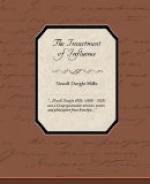Sacrifice also is the secret of beauty. After a little time the life of pleasure and selfishness will make the sweetest fact opaque and repellent, while self-sacrificing thoughts are cosmetics that at last make the plainest face to be beautiful. In the calm of scholarship men have given up the thought that culture consists of an exquisite refinement in manners and dress, in language and equipage. The poet laureate makes Maud the type of polished perfection. She is “icily regular, splendidly null,” for culture is more of the heart than of the mind. But as eloquence means that an orator has so mastered the laws of posture, and gesture and thought and speech that they are utterly forgotten, and have become second nature, so knowledge becomes culture, and physical perfection becomes beauty, only when it is unconscious.
In the moral realm also, the gains for the soul begin with loss. In the hour of temptation he who sacrifices the higher duty to the lower pleasure will find that ease has shorn away the strength of Samson.
Victor Hugo has pictured a man committing suicide through poverty, and deserting the duty and dwelling where God has placed him. But waking in the next world, the man perceives a letter on the way to himself announcing a large inheritance which would have been his had he but been patient. Therefore the great novelist affirms that God makes such a man begin over again, only under harder conditions, the existence that here he has willfully shattered. What a tragedy is his who, to save the present good, will lose the higher life. Whittier expressed the fear that Daniel Webster saved his life only to lose it. In his works the poet recalls the time when for genius of statesmanship and weight of mentality Webster’s like was not upon our earth. But in an evil hour the statesman saw that the presidency was a prize that could be gained by giving the fugitive slave law as a sop to the South. In that hour his character suffered grievous injury. In the attempt to save men’s votes he lost men’s higher respect. In deepest sorrow his admirers, abroad and at home, cried out: “O, Lucifer, thou son of the morning, how art thou fallen!”




